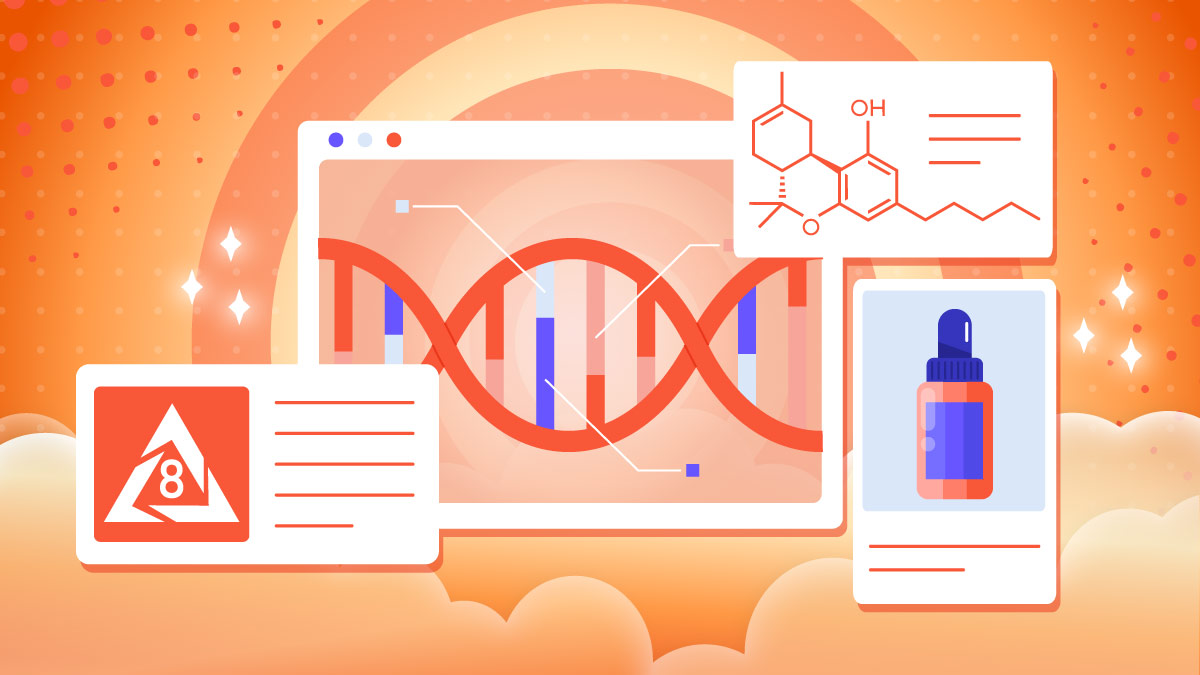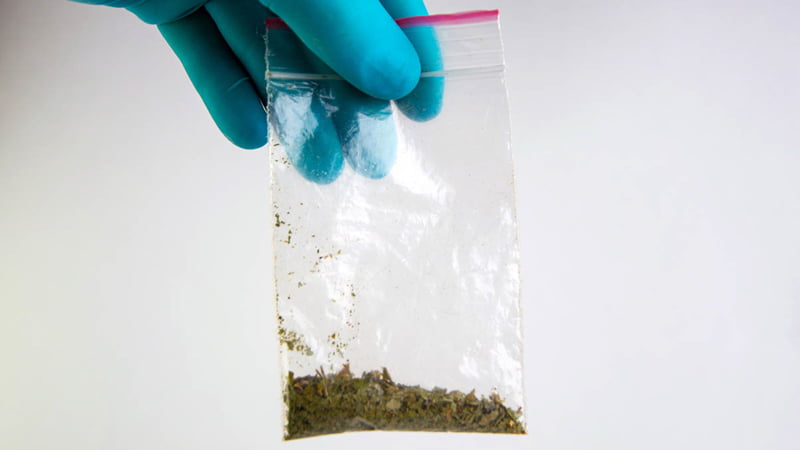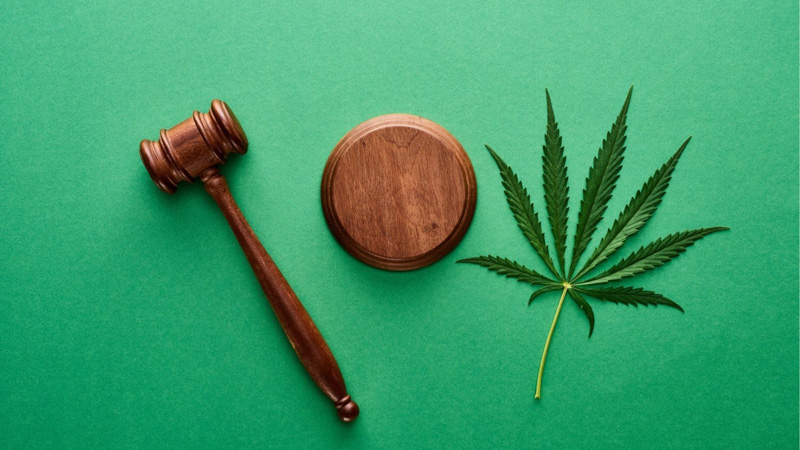Is Delta-8 THC Synthetic and Why Does It Matter?

While THC (delta 9 THC) and CBD have been the cannabinoids taking center stage for decades, other minor cannabinoids are now growing in popularity.
Unfortunately, many people — including delta 8 THC users — don’t fully understand the compound and question whether it’s natural or synthetic, as other synthetic cannabinoids have proven to be highly dangerous.
This article clears the air about whether or not delta 8 THC is natural and safe for consumption. It also discusses the legality of delta 8 THC, how it compares to synthetic cannabinoids, and the effects and potential side effects of using this cannabinoid.
What Is Delta 8 THC?
Delta 8 THC is a cannabinoid, so it’s a compound that interacts with the body’s endocannabinoid system.
It’s a THC analog, so it has a similar structure to delta 9 THC — commonly referred to just as “THC” — but with a slight difference. Structurally, delta 8 THC has a double bond at the eighth position on the carbon chain, while delta 9 THC has it at the ninth position.
How Is It Different From “Normal” THC?
Delta 8 THC is similar in its effect on the human body to delta 9 THC. It produces a psychoactive effect that most users estimate is about half as potent as delta 9 THC [1].
It’s usually considered a good option for those looking for the potential benefits of THC without as heavy of a high or for those who have issues consuming THC because it induces anxiety or paranoia. Most users note that delta 8 THC makes them feel less anxious and paranoid than the standard delta 9 THC.
Delta 8 THC also differs from delta 9 in its legality. While THC is prohibited federally and in most states, delta 8 THC remains legal in most areas across the country.
Is Delta 8 THC Natural?
Delta 8 THC is a natural compound that appears in marijuana and hemp plants without any human intervention. As such, it’s a wholly natural cannabinoid and is not considered synthetic.
Some people believe it’s a man-made cannabinoid because it only exists in cannabis plants in small quantities and requires a special process for there to be a consumable amount.
In most cases, the process of making delta 8 THC is by extracting cannabidiol (CBD) from federally legal hemp plants and convert it into delta 8 THC using an acid conversion. CBD concentration in hemp is far greater than that of delta 8 THC, so manufacturers can get a high yield of delta 8 THC using this process, making the production of delta 8 THC financially viable.
Although the delta 8 THC production process requires human intervention to generate a large quantity of it, delta 8 THC is a non-synthetic cannabinoid that naturally exists in the cannabis plant.
What’s the Difference Between Delta 8 THC & K2/Spice?

There’s also some concern that delta 8’s effects are similar to synthetic cannabinoids, namely K2 and Spice [2].
K2 and Spice are both names given to synthetic cannabinoid blends that contain highly psychoactive and potentially dangerous chemicals. They interact with the endocannabinoid system similarly to delta 9 THC, delta 8 THC, and CBD but bind more readily and strongly with CB1 and CB2 receptors, creating a more intense high.
The most significant difference between delta 8 THC and K2/Spice is that delta 8 is a naturally occurring cannabinoid, whereas K2 and Spice are synthetic — they don’t exist naturally in cannabis plants at any stage.
Delta 8 THC, delta 9 THC, delta 10 THC, CBN, CBD, and the rest of the gang are all considered the “classical cannabinoids” and share very similar chemical structures.
The synthetic cannabinoids in K2, Spice, and others all contain compounds considered “non-classical cannabinoids,” — which means the chemical structure shares nothing in common with conventional cannabinoids like CBD and THC.
Another important difference lies in legality. Delta 8 THC is legal in most states and on a federal level with only some minor restrictions. On the other hand, K2, Spice, and other synthetic cannabinoids are illegal for possession, use, and sale in most countries and throughout the United States.
It’s also important to note that the effects and side effects of delta 8 THC, K2, and Spice vary widely. Users report inconsistency in K2/Spice’s effects, and user experience is unpredictable.
Delta 8 THC Effects & Side Effects
As with all cannabinoids, there’s some concern surrounding the safety of delta-8 THC as there are some undesirable side effects associated with consuming delta 8 THC.
Most are very similar to those of delta 9 THC and are increasingly likely with larger doses. Most users report that the effects of delta 8 THC are very similar to those of delta 9 THC.
Common effects of delta 8 include:
- Relaxation or mild sedation
- A minor psychoactive effect
- Euphoria
- Reduced stress and anxiety
Common side effects of delta 8 include:
- Red eyes
- Dry mouth (“cotton mouth”)
- Increased appetite
- Intoxication (similar to THC)
- Dizziness
- Sedation
K2/Spice Effects & Side Effects
K2/Spice and other synthetic cannabinoid blends are commonly sprayed onto cannabis flower to produce a compounding effect for the user. These blends are entirely unregulated and often contain harmful additives that can be lethal.
The chemicals included in K2 and Spice can also be highly addictive and often have a much stronger effect on the endocannabinoid system. These blends can produce psychoactive effects up to 100x more potent than those associated with delta 8 THC and other natural cannabinoids.
K2/Spice and other synthetic cannabinoids have much more problematic effects on users, leading to their banning in the United States and most other countries.
The effects of K2/Spice include:
- Intense psychoactive effects
- Euphoria
The adverse side effects of K2/Spice are more plentiful and far more hazardous than those associated with delta 8 THC.
K2/Spice can elicit the following potentially dangerous side effects:
- Confusion
- Dizziness
- Irritability
- Hallucinations
- Violent behavior
- Suicidal thoughts
- Psychosis
- Heart attack
- Increased heart rate
- High blood pressure
- Stroke
- Delusions
- Psychosis
- Headaches
- Anxiety
- Depression
- Vomiting
- Seizures
- Intense sedation
- Difficulty breathing
- Kidney damage
- GI complications
- Muscle damage
- Death
It’s also important to note that other side effects of K2/Spice are possible and are unpredictable. These compounds can contain any number of chemical additives to boost potency, so other effects are possible, and since they are addictive, it’s wise to be cautious with these substances.
Is Delta 8 THC Legal?

Currently, delta 8 THC is legal on a federal level in the United States, and it remains legal at the state level in most states, as well. However, there are some restrictions and caveats.
Currently, delta 8 THC is only legal if it’s derived from hemp plants. According to the Farm Bill of 2018, hemp is defined as cannabis plants with less than 0.3% delta 9 THC by weight. The same bill legalized hemp for growth, production, possession, and sale, along with derivatives of hemp.
Delta 8 THC made from hemp-derived CBD is legal in most areas throughout the United States, even where recreational marijuana remains illegal.
Before purchasing or using delta 8 THC, you should check your local laws to ensure it is legal in your area.
Delta 8 THC: Legal, Natural, & Safe
Delta 8 THC is a natural cannabinoid that appears in marijuana and hemp plants. Most of the manufactured delta 8 THC is derived from CBD extracted from hemp plants.
It’s rapidly becoming more and more popular as a THC alternative. As an analog of delta 9 THC — commonly just called “THC” — it produces a more mild psychoactive effect in the user. Most individuals report less anxiety and paranoia and more relaxation when using delta 8 THC over delta 9 THC.
Not only is delta 8 THC legal federally and in most states, but it’s also significantly safer for consumption than synthetic cannabinoids like K2/Spice, produces a milder sense of euphoria, and comes with fewer side effects.